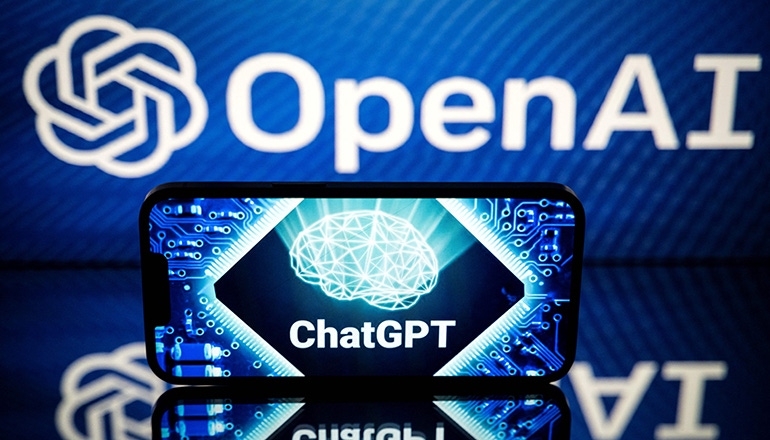ChatGPT’s ‘iPhone Moment’ Poses a New Threat to Google
The new ChatGPT plugins could turn it into the web’s switchboard, giving people a new reason to ditch Google.
April 3, 2023

(Bloomberg Opinion) -- Just as we were getting used to the idea of ChatGPT writing emails and conducting research, OpenAI has upgraded it with capabilities that make it even more of a threat to big tech companies such as Google. ChatGPT’s new plugins, released last week with relatively little fanfare, are a major leap forward for the technology.
In a nutshell, it is going from merely generating text to taking action on the web, turning it into the type of powerful virtual assistant that Alphabet Inc.’s Google and Apple Inc. have been trying to build for years.
ChatGPT’s plugins allow businesses to essentially plug the tool into their own systems so that it can do things like search proprietary datasets or even carry out tasks like booking a restaurant, or writing and executing code. There are serious potential risks from this, but in the corporate game of technological one-upmanship, OpenAI has created a daunting new front against the incumbents.
That’s because for the plugins to work, users have to visit the website of ChatGPT itself, according to demos of the new system. For instance, American users of ChatGPT will soon be able to go to the tool’s main page and select the plugin for Klarna Bank AB, a payments facilitator for thousands of brands like Nike Inc. and Gucci. Once they select Klarna, they could ask ChatGPT to make product recommendations for a gift for their sister. Thanks to the powerful language model underpinning ChatGPT, known as GPT-4, they can give the kind of detail they’d share with a human retail employee, laying out at length how their sister loves movies and kayaking and is in their 30s, for instance. ChatGPT can then make the recommendation.
“We have a proprietary database of tons of products that ChatGPT can structure,” Klarna’s chief marketing officer, David Sandstrom, told me. “Instead of you and I searching for products in our product database, we will have a conversation with a shopping assistant.”
Technically, companies could have done this already, since OpenAI has made its language models available to third parties since 2020. But the plugin system is a much easier way to facilitate that, according to Edo Liberty, the former head of Amazon’s AI Labs and current CEO of Pinecone, an AI startup that has a technical partnership with OpenAI on its “knowledge retrieval” plugin. (Disclosure: Bloomberg has released its own language model for finance, which will likely compete with OpenAI’s GPT-4.)
Liberty said the retrieval plugin, which Klarna is also using, has become immediately popular among software developers. One of the reasons for the rush is that as more people use ChatGTP and come up against errors about specific issues, organizations can prevent the tool from “hallucinating” about their work by plugging the tool into their own data.
If a researcher wants to quickly draw up a table of key landmarks in climate mitigation, for example, they can ask ChatGTP to do so using a United Nations plugin, giving them a more reliable summary of the official milestones, according to one demo, than if they asked ChatGPT (sans plugin) for the same information today. Similarly, car manufacturers could plug ChatGPT into their user manuals so that drivers can get immediate answers to questions about their vehicles, Liberty suggests.
Companies can use the same technology for internal purposes too, in the same way Morgan Stanley has been using OpenAI’s GPT-4 to answer questions posed by 200 of its wealth advisors when they are dealing with clients. Morgan Stanley told me the new system allows them to synthesize proprietary details on an asset class for clients in seconds instead of half an hour.
Of course, the bigger play will be for consumers who use ChatGPT to search, book flights and make purchases. This is a capability that Google has offered for years through its Assistant and Search page. But as more businesses hook themselves into ChatGPT and the tool becomes more popular, effectively becoming a switchboard for the web, that will draw more eyeballs away from Google’s own services.
Google’s own ChatGPT competitor, Bard, does have the advantage of a popular ecosystem of products used by hundreds of millions of people that it can plug into, from Gmail to Google Docs. Imagine, for instance, waking up in the morning to an email pre-written by Bard to your friend, whose birthday you’ve forgotten, but which sounds eerily personal because the system has been trained on your previous interactions. This is not something Google has announced, but it’s the type of compelling service you could see it offering eventually with Bard.
OpenAI doesn’t have similarly popular products it can build ChatGPT into, but it is a neutral third party that millions of businesses can quickly exploit with few strings attached. And it has shown itself to be much more nimble than Google.
Some have described ChatGPT’s plugins as the tool’s “iPhone moment,” i.e., the milestone when Apple first allowed third-party app developers to build for the iPhone, sparking the device’s explosive popularity. Eventually every business came to believe they had to have an app. If OpenAI can handle the demand, we may well be witnessing the same kind of landmark for ChatGPT.
Read more about:
Google AlphabetAbout the Author
You May Also Like









